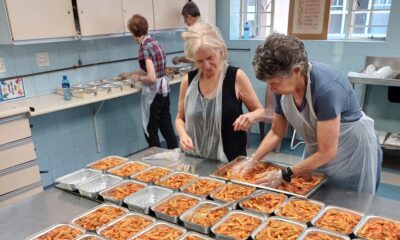
Featured Item

Adoption not easy, but parents have no regrets
From trying circumstances, to infertility, to the desire to give a child a home, there are different motivations for adoption. In the wake of National Adoption Month, we chat to Chevrah Kadisha Social Services as well as to adoptive parents and children.
Every July, Kevin and Mandy Harris*, the latter now 13, celebrate “adoption day”, the day they say they adopted each other. “Mandy started living with me when she was two years old,” Kevin recalls. “I’d known her mom, Dana*, for a number of years. She had fallen on hard times, contacted me out of the blue, and I offered her and her daughter a place to stay.”
A few months later, Kevin and Dana began a relationship which lasted for just less than two years. “During that time, Dana was troubled and often absent, and I spoke to her about possibly adopting Mandy,” Kevin recalls. “I spent a large amount of time taking care of Mandy, and we began developing a close bond. In 2015 after our breakup, Dana went into rehabilitation, and she never came back.”
Kevin then sought help from Chevrah Kadisha Social Services and met late social worker Zoe Cohen. “She was part of my support structure for dealing with Dana and finding myself a sudden father.” After a lengthy process that involved getting legal consent from both biological parents, Kevin officially adopted Mandy in July 2019.
“By that stage, I thought of myself as Mandy’s father,” he says.
In adopting Mandy, he eliminated the risk of either biological parent taking her away. “I was already putting her through school, and it’s important to me that she has the best upbringing I can possibly give her. I never want her to be in the position that her mom found herself in, both in terms of addiction and depending on others for accommodation.”
Today, Mandy is a thriving teenager. She and her mother have a relationship of sorts, but all their in-person meetings are supervised. “I’m a big believer that if you can have some sort of contact with your biological parents, you should, as long as the interactions are positive,” Kevin says.
Nevertheless, Mandy has been to therapy to process lingering feelings of abandonment and anger towards her birth parents.
“To me, Kevin is my actual father,” Mandy says. “I would have it no other way, even though he’s the one that makes me sassy. I’ve had a lot of questions at school about how I was adopted, but I always say, ‘He’s my father, end of discussion.’”
Kevin feels the same. “Sometimes, I think about other choices I could have made, yet they all end with the thought that Mandy wouldn’t have been with me. I get cold shivers thinking about what might have happened.”
Shirley Band* and her husband began caring for their grandson, Jason*, now 11, when he was just more than a month old. “My daughter was unwell, and couldn’t look after Jason,” Band recalls. Grandparents, she says, don’t have any automatic rights. “So, we applied to be foster parents and were given custody when Jason was just more than four months old.” They remained foster parents for two years, the standard for temporary placement.
“As my daughter’s circumstances didn’t improve very much and the father wasn’t in the picture, the judge later made us foster parents until Jason turns 18.” Yet, the Bands decided that adoption would be preferable as it would afford them full parental rights without government involvement in everything from medical to travel arrangements. “If you really want the child to be safe instead of being moved from one place to another, then you have to adopt as early as possible to limit trauma,” Band says.
She admits that while she’s fortunate to have adopted her maternal grandson, who has been loved from day one, adoption isn’t an easy road. Her daughter, who is now doing better, is involved to some extent, but this sometimes creates disagreements. Ultimately, however, she and her husband are Jason’s legal parents.
“Adoption ultimately brings lots of joy,” Band says. “I’m quite strict and I’m not a softy, kissy Jewish grandmother, but I think what you gain is the pleasure of giving.”
Melissa Jordaan, a social worker at the Chev, advises those considering adoption to educate themselves. “Understand what the process entails and think deeply about the sort of child you would want to adopt, from age to race to background,” she advises. Should the parents want a non-Jewish child to convert, the Chev helps them liaise with the Beth Din and provides support.
The Chev also provides counselling for biological parents considering having their child adopted. And it screens prospective adoptive parents in terms of their medical and personal history and financial status, and refers them for mandatory psychological assessment.
It helps to facilitate a bond between the child and prospective family, and manages the formal legal adoption process. This generally takes between six to 12 months. The Chev also helps adoptees over the age of 18 to trace their biological families.
“There’s a big shift towards having open, age-appropriate conversations with adopted kids to tell them their story in a way that makes sense to them,” Jordaan says. Even if you adopt a baby, she cautions, children who are separated from their birth parents come with a difficult story – something she refers to as a “primal wound” – that will always be with them. “Parenting biological kids isn’t always easy, but those who adopt have to be more mindful and process issues in advance.
“We have a responsibility to let adoptive parents know the child’s exact background, so they know what they’re taking on and are properly equipped,” Jordaan says. “Managing adoption is a massive responsibility. It’s an invasive process, but ultimately it comes with immense joy.”
- Those seeking adoption services can contact the Chev’s Social Services on 011 532 9616 or socialservices@jhbchev.co.za
*Name has been changed










